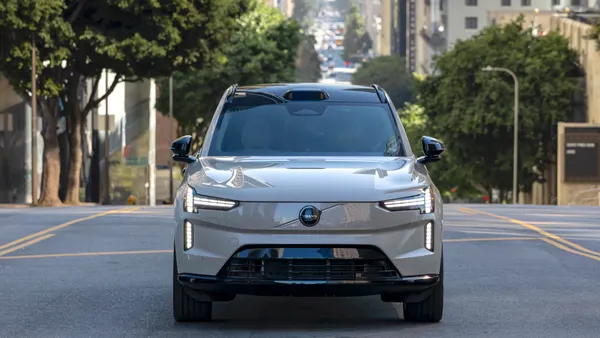Editor's note: This story is part of the WardsAuto digital archive, which may include content that was first published in print, or in different web layouts.
Toyota, Honda and Nissan appear to have taken criticism to heart two years after parts makers called them out in Planning Perspectives’ annual study on supplier relations in North America.
All three have rebounded nicely in the latest report to be released today by the Birmingham, MI-based firm, meaning the performance gap once again is widening for Detroit-based automakers.
The study, now in its 14th year, surveys suppliers about their attitudes toward nine automakers operating in North America, including the three Japanese, plus Ford, General Motors, Chrysler, BMW, Mercedes and Volkswagen.
The roughly 50-question survey covers five broad areas: OEM Help, OEM Hindrance, OEM-Supplier Relationship, OEM Communication and Supplier Profit Opportunity. This year it was completed by 411 sales people from 362 Tier 1 suppliers.
Toyota, Honda and Nissan, which had fallen to all-time low scores over the past two years, all have rebounded in 2014. Top-ranked Toyota now scores 318 on the index, up from 296 in 2012, while No.2 Honda, judged the “most preferred” customer by suppliers, is rated at 295, up from 287 last year.
Nissan, which had fallen to No.4 behind Ford, is back up to third place in the ranking, having improved its score 17 points from year-ago.
“You’ve got leaders doing the right thing, buyers doing the right thing at the Japanese (automakers),” Planning Perspectives CEO John Henke tells WardsAuto. “(And) the three Japanese OEMs are starting to pull away again. I think that is critical.”
He blames their recent decline on adverse effects of the 2008 recession, 2011 Japan earthquake and growing purchasing staffs that caused the transplanted automakers to “lose their way.”
Relations are seen improving further for Toyota as it relocates its purchasing staff from Kentucky to Michigan, where its engineering operations reside, although Henke admits there is a chance of negative impact if too many veteran department managers decline to make the move north.
Detroit 3 Run Flat and Lose Ground
Conversely, after several years of gains, GM, Ford and Chrysler posted a relatively flat performance, causing the gap with the Japanese to widen.
Ford, the top-ranked Detroit-based automaker, had climbed to within 30 points of Toyota in 2012, but has shown no improvement in the past four years and now trails by more than 50 points.
Chrysler declined for the first time in six years, but still managed to move ahead of GM on the Planning Perspectives scale. However, both lag Toyota by more than 70 points.
Some of the Detroit Three’s low marks result from years of negative perception, Henke says, citing in some cases “urban legends” involving intellectual property theft or other poor treatment in the past that may have respondents rating those automakers more harshly.
“It’s mostly perception, not reality,” he adds. “But it’s happened more with the domestics than it has with Toyota and Honda.”
And as suppliers get more experience with the Japanese automakers, which are widening their purchasing nets to draw in more American-based companies, they also are demanding similarly better treatment from GM, Ford and Chrysler, Henke says.
“We see a trend with more and more suppliers driving south on I-75 to provide goods to the Japanese (automakers),” Henke says. “(So those companies) are more aware of what it’s like now, and they’re starting to raise the bar. They’re expecting more from the domestics.”
Planning Perspectives only recently began looking at the German automakers and doesn’t fully incorporate their results into its rankings. If it did, BMW would be the No.2 automaker, but Mercedes would be well below GM and Volkswagen would be in “a very distant last place by a large margin,” the firm says.
Henke contends the VW score is reflective of the attitude of its suppliers worldwide.
“I’m surprised Volkswagen is (rated) as high as it is,” he says. “They are the worst of the OEMs in Europe, as it relates to suppliers. They always have been.”
Among other key findings from this year’s study:
- Toyota and Honda purchasing executives and buyers are rated tops in working to build trust and being most transparent in providing information.
- GM purchasing chief Grace Lieblein gets high marks for building trust as well, but the automaker’s buyers are ranked low in the category, outrunning only Chrysler in that regard. “That suggests to me they don’t have metrics in place (to transform purchasing-staff behavior),” Henke says. “There are just too many buyers who are off doing their own thing.”
- The trust factor at Chrysler is at its lowest level in two years and trending downward. “The leaders aren’t leading and moving toward it, and the buyers aren’t getting it,” Henke says.
- Ford purchasing head Hau Thai-Tang is ranked last on trust. But Henke attributes that to the short time he has had in the position. Despite Thai-Tang’s low marks, Ford’s buyers outrank GM and Chrysler’s in this category.
- GM is judged the worst in protecting suppliers’ intellectual property and proprietary information, and it is the least likely to allow suppliers to recover material-cost increases, according to those surveyed. Things might have gone worse for GM had Lieblein not backed off on some controversial contract terms that had angered suppliers, Henke says.
Positive supplier relations translate directly to the bottom line, Planning Perspectives says, because OEs that treat suppliers well get the best technology, price and service. Henke intends to demonstrate that theory with another study due later this year.









